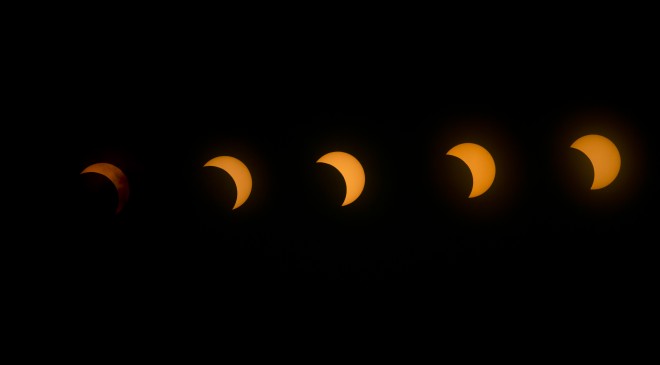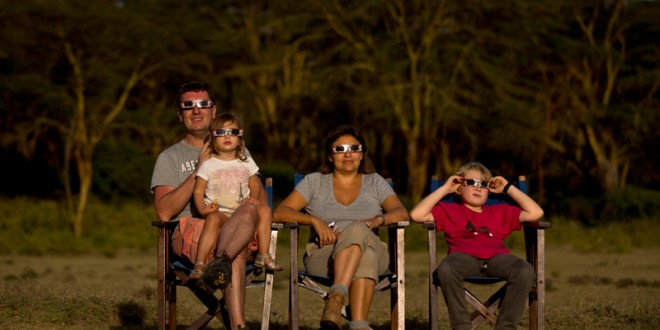
This multiple exposure image shows the transition from right to left of a hybrid solar eclipse seen over Lake Oloidien near Naivasha in Kenya Sunday, Nov. 3, 2013. A rare solar eclipse swept across parts of the US, Africa and Europe on Sunday with some areas witnessing a total blackout and others experiencing a partial version. AP
NAIROBI—Africans were treated Sunday to a spectacular solar eclipse that swept across the continent, while sky-gazers in the United States and Europe also glimpsed the rare phenomenon.
A total eclipse could be seen over parts of Africa and one of the best views was in northern Kenya’s Sibiloi national park, where a few hundred tourists gathered on the edge of the desert lake Turkana.
Alongside the tourists were colorfully dressed Kenyans from the Turkana, Rendile and Dasanach tribes, many draped in beads, who cheered as the sky darkened.
But dramatic weather almost spoiled the show, with sandstorms, rain, a rainbow and heavy cloud all minutes before the eclipse, an AFP photographer said.
Some tourists, fearing they would miss the sight, jetted off at the last minute, seeking a clearer spot on other side of lake.
In the end the eclipse, which lasted about 10 seconds in Kenya, was partially obscured by cloud.
Sky-gazers in Gabon, Congo, Uganda and Ethiopia were also treated to the total eclipse.

Belgian tourists watch a hybrid solar eclipse from Lake Oloidien near Naivasha in Kenya Sunday. AP PHOTOS/BEN CURTIS
“I saw a black disc progressively cover the sun. It’s magnificent,” said Clarence Diledou, who lives of Gabon’s port town of Port-Gentil.
Bad weather spoiler
“But unfortunately the bad weather spoiled the party a bit.”
The west African nation got peak viewing of the total eclipse as it swept over a path nearly 60 kilometres (37 miles) wide.
In Port-Gentil, families gathered together for the occasion along the sea front, facing the sun.
Like many in the town, Diledou used special glasses distributed by authorities to watch the rare event.
Those who did not have any came up with imaginative solutions, among them Pauline Koumba, who put a bowl of water in her courtyard and watched the reflected eclipse.
“I saw the brief passage of the eclipse in my bowl. But it was over quickly and the black clouds spoiled the effect,” she said.
Families also gathered in Gabon’s capital Libreville, where the eclipse was less spectacular, but where the skies darkened noticeably for about half an hour from 1330 GMT.
In the eastern United States, viewers caught sight of a partial eclipse lasting 45 minutes close to sunrise.
Partial views were also available in southern European countries Spain, Italy, Greece and also in Iraq.
The round shape of the Earth explains why viewers in Africa saw a total eclipse, while those in the United States and Europe only saw the sun partly obscured.
Experts say a safe way to view an eclipse is by making a pinhole camera—piercing a tiny hole in a piece of paper then turning your back to the sun and using the pierced page to project the image of the sun on another sheet of paper.
A map of the eclipse’s path can be found at: u.afp.com/wi4.

